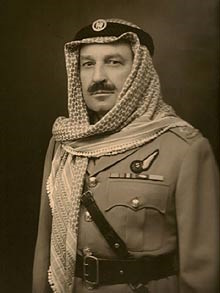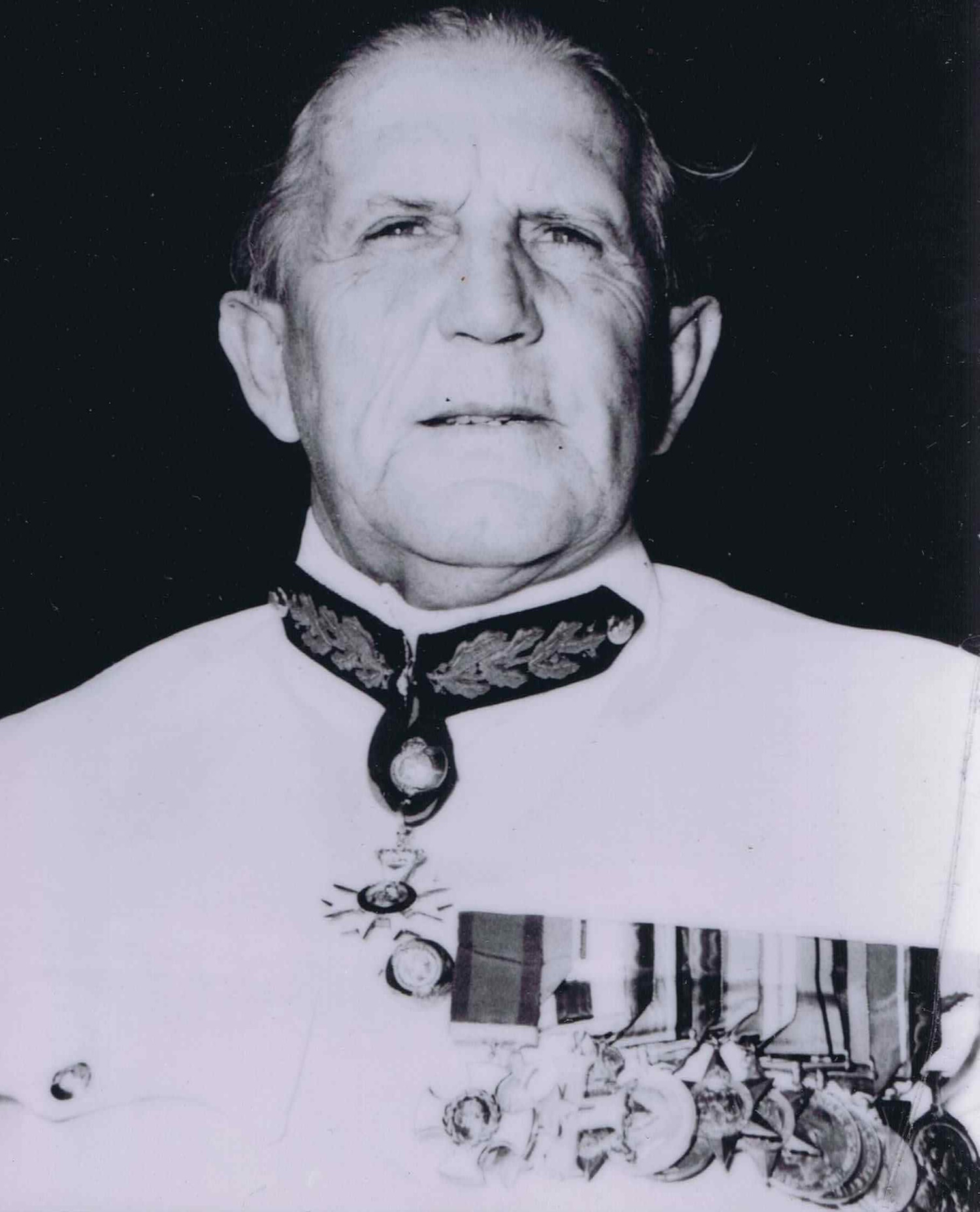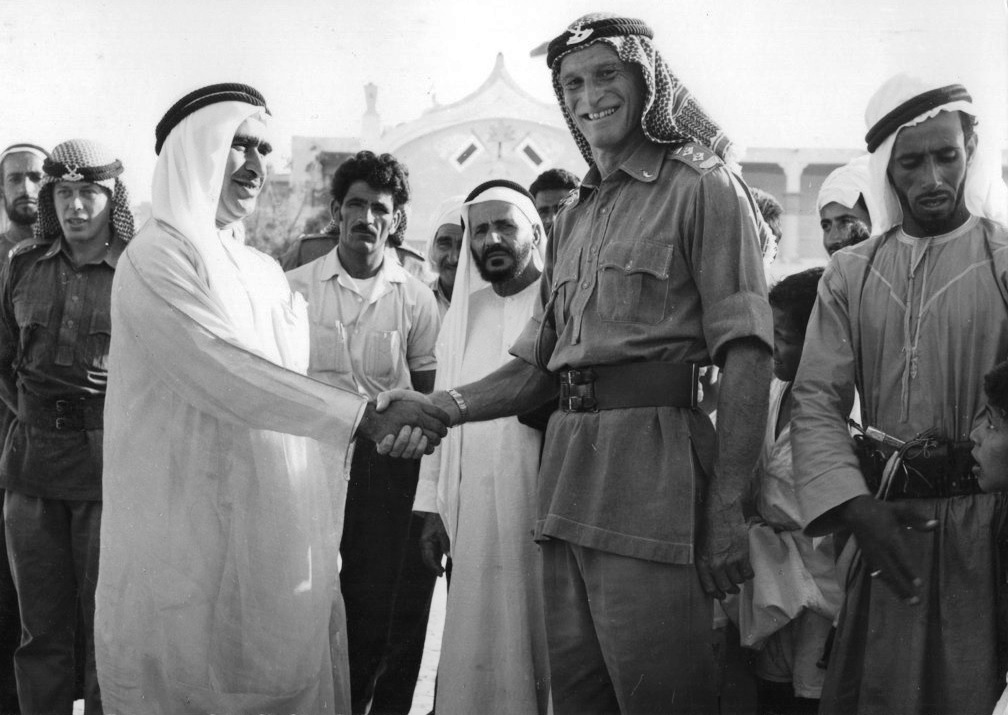Colonel Edward 'Tug' Wilson
Adventurous British soldier who founded the army in Abu Dhabi and later ran the royal stables there
5:42PM GMT 03 Feb 2009
Colonel Edward "Tug" Wilson, who has died aged 87, was the founder and first commander of the Abu Dhabi Defence Force.

As a major in the Worcestershire Regiment he volunteered in 1961 for service with the Trucial Oman Scouts, and took command of "A" Squadron in a Beau Geste-style fort at the Buraimi Oasis, Al Ain. The area was then part of a wider British protectorate in the Gulf and is now in the United Arab Emirates.
He struck up a friendship with Sheikh Zayed bin Sultan Al Nahyan, based on a shared love of falconry and riding together in the mornings. After Abu Dhabi began exporting oil, the administration of Sheikh Shakhbut (Sheikh Zayed's elder brother) came under pressure to put in place a modern state.
Wilson was seconded to the government of Abu Dhabi in the rank of colonel, with responsibility for raising and commanding a defence force. This also involved coping with low-level insurgency, though on one occasion he ended a strike at the Abu Dhabi petroleum company at Tarif and, on another, sent a squadron to help Danish archaeologists restore the 5,000-year-old tomb at Hili.
Shakhbut was known for his caution and slowness to innovate and, in 1966, the ruling Al Nahyan family decided that he should step down and be replaced by his younger brother. Sheikh Zayed stayed with Wilson for the two days before the transfer of power on August 6. Wilson then took control of the radio station, and was assigned the task of escorting Sheikh Shakhbut from the Al Hosn Palace to the airport to start an honourable exile.
Wilson showed outstanding ability in transforming the nucleus of a Bedu force into a modern army. A naval squadron and an air wing were developed, and he travelled widely to procure weapons and other equipment.
When he recommended that Abu Dhabi should buy the Italian Aeromacchi fighter rather than the British-made Hawker Hunter – because the former was better suited to desert operations – it led to a stormy meeting with Lord Mountbatten, who had only just retired from the post of Chief of Defence Staff. Wilson refused to back down – resistance that would cost him his job.
Edward Bearby Wilson was born at West Hartlepool, Yorkshire, on January 18 1921 and educated at Ayton Friends' School, North Riding, and Constantine College, Middlesbrough. Always known as "Tug", he started to train as a wireless operator and in 1945 was selected for officer training at Sandhurst, where he played cricket to Army level while enjoying shooting, hockey, golf and squash.
On being commissioned into the Worcestershire Regiment, he was posted to the 1st Battalion in BAOR, then seconded to the 2nd Division Signal Regiment, taking part in the Berlin airlift. He also took up motor-cycle racing and competed on many of the famous European circuits before returning to his battalion to serve in Malaya during the Emergency. He was mentioned in despatches and won the Johore Motor-Cycle Grand Prix.
Around this time he started climbing in the Austrian Alps and then in the Himalayas, where he learned much from Colonel Hugh Boustead, who had been on the 1933 Everest expedition and was political agent in Abu Dhabi.
In 1952, after spending the winter in Korea, Wilson was posted to the Battle School at Hara Mura, Japan, to train the British contingent. During one exercise, which he devised, he dislocated both his shoulders after a hand grenade exploded. He was a superb shot and, on the ranges in command of the firing party in a competition known as "Falling Plates", his idea of keeping the officer in charge of the butts on his toes was to shoot the heavy lead target out of the man's hand as it was being put in place.
He organised live-firing exercises that were close ("sometimes too close") to real warfare. Those units camped nearby, but not involved – "at least, not voluntarily" – in the exercises, had to dive for cover as the bullets smacked into the trees around them. On one occasion, after a lively exchange of mortar bombs, the visiting CO, barely able to see his hand in front of his face, bellowed: "Good God, Wilson! There's enough smoke here to cover a divisional front!"
Rejoining 1 WR, he had an independent command in British Honduras before returning to England with responsibility for training recruits for his regiment. His service in Abu Dhabi followed.
A short, stocky, handsome man, Wilson was held in great affection by his soldiers. A marvellous raconteur, he would sit with them around the camp fire and swap stories as the laughter floated into the Arabian night. He was also, however, a strict disciplinarian with a keen eye for detail, and demanded the highest standards from those who served under him.
After being recalled from Abu Dhabi in 1969, he instructed at the Royal Naval College, Greenwich, and then at Staff College, Camberley, before retiring from the Army in 1971.
Wilson moved to Devon and for three years threw himself into the task of establishing a successful trout farm, saying: "I had spent so much time in the desert that I missed the sound of running water." The life, however, proved too tame, and in 1974 he accepted an invitation from his old friend Sheikh Zayed to return to Abu Dhabi as director of the royal stables.
Over the next 30 years they built up a stud of Arab bloodstock that won awards worldwide. Wilson was closely involved in the formation of an equestrian club and in the promotion of the racing programme. In 1990 he took part in the London-Beijing Motor Challenge, driving almost 10,000 miles overland. Three years later he again decided to retire to Devon, but was refused permission. An official letter declared: "His Highness says that you are a pillar among the unshakeable pillars of the emirate, a respectable person who has always been so, and so will you remain."
Tug Wilson, who received the Star of Jordan from King Hussein in 1968, accepted that he would spend the rest of his life in Abu Dhabi, and it was there that he died on January 2. He married, in 1971, Patricia Valentine (née McLeary). She predeceased him, and he is survived by their son and two stepdaughters from her previous marriage.
Col Sir John Edmond Hugh Boustead, KBE, CMG, DSO, MC & Bar (14 Apr 1895 – 3 Apr 1980)
There is much more to say about Sir Hugh Boustead, a true hero in the Boy’s Own Paper tradition, a man of Odyssean calibre and achievement, but this is a perfect place to start.

The adventures of a Gordon Highlander World War 1 hero revealed
by Conor Riordan
16/08/2016, 8:20 am
World War 1, the Russian Civil War and an Olympic Games are not the sorts of things everyone can say they’ve been involved with.
But former Gordon Highlander Colonel John Boustead could, and as the Olympic Games continues, the Gordon Highlanders Museum in Aberdeen is highlighting the eventful life of the adventurer.
Curator of the museum Ruth Duncan said: “He certainly sounds like he was a character, I think he loved the life of adventure and made sure he lived it.
“You name it, he’s done it. He lived a really full life.”
Born in 1895, Boustead was serving in the Royal Navy in 1915 when in South Africa.
The tea planter’s son always hated conditions of life at sea so saw his chance and jumped ship, deserting his men.
But as soon as he could he joined the South African Scottish Regiment under a false name, and was fighting on land in France by 1916.
His regiment played a key role in the fight for Delville Wood during the Battle of the Somme but casualties were heavy – 900 out of 1,000 men were lost over four days of fighting – and Boustead was forced back to England to recover from a wound.
He returned to France as a second lieutenant and was placed in charge of the regiment’s sniper and intelligence sections.
But disaster struck when he was shot in the leg while leading his gunmen around a heavily fortified German position in the town of Roeux.
The bullet cut his main artery and his life was only saved because of the quick actions of a comrade, who applied a field dressing as a tourniquet.
Boustead received a Military Cross for his actions, which was presented to him by King George V at Buckingham Palace.
Once fully recovered, Boustead applied for a transfer back to the Western Front.
He helped to force a German retreat and was in France when the Armistice was declared in November 1918.
Time for a new adventure then, so Boustead volunteered to fight in the Russian Civil War against the Cossacks.
Ruth added: “He pretty much rode about with a Lewis gun across his back and defeated the enemy.”
On his return he went to Oxford University to read Russian, something he picked up at war, while waiting to be commissioned to the Gordons.
But he was also a fantastic sportsman.
He competed regularly in Army boxing championships and even captained the Great British modern pentathlon team at the 1920 Olympic Games. He finished joint 14th in a field of 23 competitors.
His achievements flourished in the Gordons, which he joined in 1921, and he became heavily involved in the regiment’s physical training programme as an instructor while based in Turkey and Malta.
He also got his first taste of Alpine winter climbing at this time, spending his leaves climbing and trekking in Austria, which shaped his love of mountaineering and strengthened an ambition to climb Mount Everest.
Boustead always harboured a desire to climb the highest peak.
His dreams came true when he was invited on Hugh Ruttledge’s Army expedition in 1933.
Boustead and a small team were responsible for establishing camps in advance of the main party and for clearing and preparing the route for the equipment-bearing porters.
His team faced daunting obstacles – including a 40ft ice wall.
Boustead reached the final camp pitched at over 25,000ft, but he was never included in the final ascent party, which ultimately failed.
He experienced severe frostbite in his toes on the descent and had to be lifted on and off a Tibetan pony across the plains of Tibet to get home.
Bousted went on to serve during World War 2 as well as being district commissioner in the Darfur region of the Sudan for 25 years.
He died in 1984.
Braveheart
UAE salutes its first armed forces chief of staff — Brigadier Freddie De Butts.
Published: September 22, 2005 00:00 By Daniel Bardsley, Staff Reporter
Freddie De Butts was the first chief of staff of the UAE armed forces. At his funeral, he was described as "the best commander".
When Freddie De Butts became an officer in the British Army, he undoubtedly had ambitions to emulate the success of his father, who ended his career as a brigadier.
However, the brigadier rank that De Butts carried into retirement was not one conferred by his home country's army, but instead was given by the UAE.
Freddie De Butts — who was British despite his Dutch name — was the first-ever chief of staff of the UAE armed forces.
The officer, who died last month aged 89, was called out of retirement to act as chief of staff of the Union Defence Forces, selected because of an earlier three-year stint as commander of the Trucial Oman Scouts (TOS) before British withdrawal.
While De Butts commanded the UAE military for one-and-a-half years between 1971 and 1972, a navy and air force was added to the fledgling nation's army.
For this and his other achievements, De Butts is remembered as one of the most significant British figures involved in the creation of the UAE.
His son David De Butts, 54, said his father was "very proud" to be called out of retirement to return to the Arabian peninsula.
The call came from Sir William Luce, who had been appointed by Britain's Foreign Secretary to come up with policies to ensure stability after British withdrawal, to act as director of his Military Liaison Office.
A new chapter
De Butts became chief of staff when the UAE was founded, on December 25, 1971.
In this role, he worked with General Shaikh Mohammad Bin Rashid Al Maktoum, Defence Minister and now also Crown Prince of Dubai.
As well as helping to establish the navy and air force in 1972, De Butts set up the country's first military academy in Abu Dhabi where Arab officers were trained.
His son said the brigadier was particularly pleased to return to the region since his time as commander of the TOS — created to maintain stability in what was then the Trucial States — between 1964 and 1967 had been very fulfilling.
"It was his best job in the British Army. He loved it. He was the main man in the place. It was in the days when communications were much less developed than they are now, so he was much more his own boss.
"He was in a position where there was something to be done and he had the authority and commanded the respect to go ahead and do it," he said.
The UAE of the late 1960s was very different to the advanced nation it is now, according to De Butts's son, who visited his father during school holidays.
"It was amazing really because Sharjah at that time was a very simple place. There were no buildings more than two storeys high."
De Butts, born in 1916, came from what is described as "a very military family". At least five previous generations of De Butts's family were in the British Army and at least two of his forebears were generals.
After boarding schools in England, De Butts studied modern history at Oriel College, Oxford, before joining the army.
He was posted to India but when the Second World War broke out he was sent to Egypt, where he served mainly as an intelligence officer. De Butts saw further wartime action in Italy, France and Germany.
Overseas postings after the war included stints in India and Malaysia, during which there was a peaceful transfer of power to a non-Communist Malaysian government.
In 1953, De Butts was returning home when the troopship Windrush sank after her boilers exploded. Along with his wife, son and daughter, De Butts sought refuge in the ship's lifeboats.
Two years later, De Butts was sent to Cyprus on anti-terrorist operations and, after a posting back in England, he was sent to Aden where his command of the Third Battalion of the Aden Protectorate Levies earned him an Order of the British Empire (OBE).
His time as TOS commander came after several years in the UK and was followed by his final British Army appointment, as defence attaché in Cairo. He retired from the British Army as a colonel.
Tributes galore
"He was a most remarkable person. I don't think I ever heard him raise his voice and yet he had more respect than anybody I have known."
"At his funeral, one of his men who served in Arabia with him said he was the best commander he ever had because not only was he totally respected, but you also felt he was your friend. That's a very difficult balance to achieve," said his daughter-in-law Barbara De Butts.
In retirement, De Butts remained very active on several fronts, acting as Commissioner of the Hertfordshire Scouts, chairman of a school's board of governors, a district councillor, chairman of the Hertfordshire Society and a Deputy Lieutenant of Hertfordshire.
De Butts often took guides and scouts, as well as his own grandchildren, on outdoor expeditions.
"He would take them skiing and mountain climbing and he never lost patience with them. They admired him and he loved young people."
"He had very high standards and he expected his grandchildren to behave properly when they saw him, but when he was with the scouts he softened considerably," Barbara De Butts said.
De Butts is survived by his wife Simone, his children David and Caroline, and six grandchildren.



